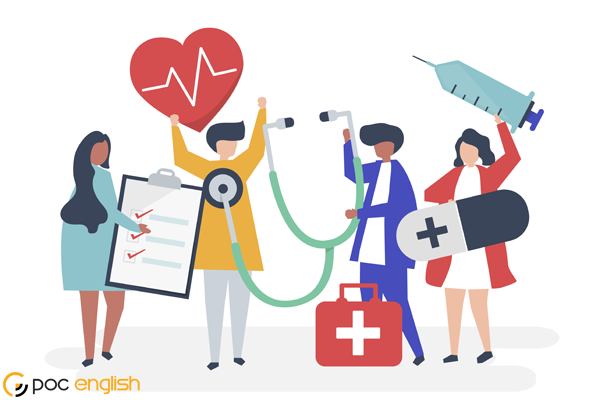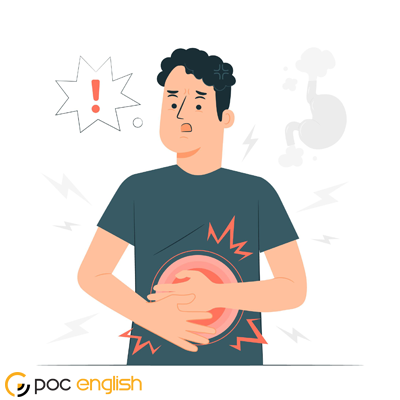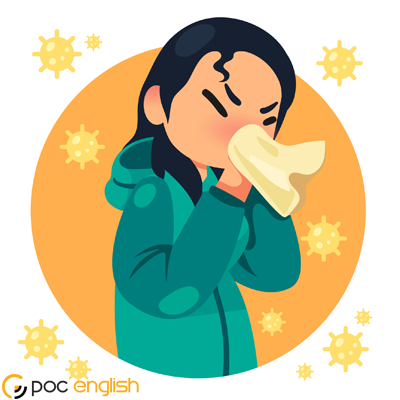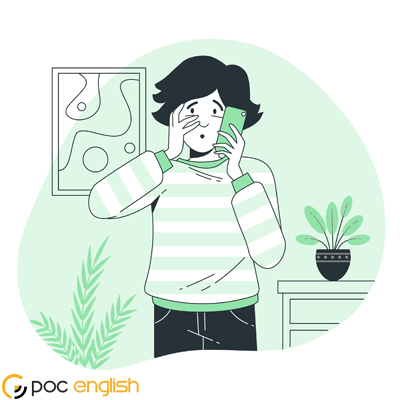Everybody needs to know the most common health problems vocabulary and the way it is used in conversations. If we can express our symptoms correctly, we can get help to improve our disease, and we will get better sooner.
Learning about sickness vocabulary is really important because it helps us understand our bodies better. When we know the names of different health issues like a cold, fever, or a broken bone, we can explain how we feel to grown-ups like doctors or nurses. This way, they can understand us better and help us get the right treatment to feel better quickly. It’s like having a special language that helps us communicate about our health.
In this lesson, we are going to learn the most common illness vocabulary. If you become sick, these words will help you describe your situation. So, let’s get started!
This text is from one of my friends who is sick, let’s see what he is going through.
Talking about health problems: Jo’s text
“I don’t get sick very often. I may have aches and pains from time to time, but I have never been at death’s door. This morning, however, I was feeling out of sorts! I have a runny nose and sore throat. I think I’ve caught a cold.”
Let’s have another look at what my friend has said and learn some health and sickness vocabulary.
To get sick : Of sickness vocabulary
Pay attention to the verb. When we want to say that we are sick, we use “get”. We can also use “become” (to become sick”).
Instead of “sick” you can use its alternative, “ill”.
Aches and pains : Of illness vocabulary
Aches and pains are also in the list of illness vocabulary. These words are minor pains and illnesses.
From time to time
“From time to time” is also another item of health vocabulary that is another way of saying “sometimes”.
To be at death’s door: OF health and illness vocabulary
The other item of the illness vocabulary list is “To be at death’s door”. This idiom means to be so close to death and to be so sick that you feel you are dying.
To feel out of sorts
Instead of saying “I was sick” you can say “I feel out of sorts”, which is of health and sickness vocabulary.
A runny nose: Of sickness vocabulary
When you have a runny nose, your nose is always wet, and you have to clean it with a tissue.
Sore throat
Another word that you can use when talking about health problems, is “sore throat”. When you have a sore throat, you have pain in your throat and it’s too difficult to swallow.
To catch a cold: Of health problems vocabulary
“Caught” is the past and past participle form of “catch”. “To catch a cold” means to become sick.
Read more: Learn about health idioms in English
Talking about health problems: Jessie’s text
Now, let’s see what my other friend, Jessie, has to say.
Hey mate! I’m as sick as a dog today! I was a bit under the weather last night, but I didn’t think it would exacerbate! I feel really poorly, and I need to make an appointment with my doctor! Plus, I don’t think I can go to work! I have to call in sick.
Let’s have another look at what Jessie said to learn some health and illness vocabulary and phrases.
To be sick as a dog: Of sickness vocabulary
This is a very informal way of saying “I’m sick”.
To be under the weather: Of health problems vocabulary
“To be under the weather” means to be a little sick or to feel a little bit unwell. For example:
– I feel under the weather today!
To exacerbate: Of illness vocabulary
“Exacerbate” is also in the list of health vocabulary that means to get worse. Don’t forget that “exacerbate” is a very formal verb.
To feel poorly: Of health and illness vocabulary
“To feel poorly” means to feel a bit ill. “To feel really poorly” means to feel really sick.
To make an appointment
“An appointment” is a fixed schedule of meeting somebody. “An appointment with your doctor” means that you have a fixed schedule of visiting your doctor.
What is the verb that we use we appointment? Make
“To make an appointment” means to call your doctor’s office and ask for an appointment.
To call in sick
“To call in sick” or “to phone in sick” means to call your work and say that you cannot come because you are unwell and under the weather.
Read more: What are the personality adjectives in English?
Talking about health problems: Jack’s text
Now, let’s talk to my third friend, Jack.
Well, I’m a bit off-color today! A few days ago I had a heavy cold, but now I think I’ve gone over the worst! I think I’ve gone down with the flu, but I’m on the mend now!
Let’s have another look at what Jack said to learn some health problems vocabulary and phrases.
To be a bit off-color: Of health problems vocabulary
“To be a bit off-color” means to have pale skin, because you are sick.
To have a heavy cold: Of health and illness vocabulary
“To have a cold” means to be sick. “To have a heavy cold” means to be seriously sick. So, you have 3 ways to say that you are sick
- To have a cold
- To have a heavy cold
- To catch a cold
To go over the worst: Of sickness vocabulary
“To go over the worst” means to go through the most painful and most serious stage of illness. For example:
Last night I was really sick, but today I’m better. So, I think I’ve gone over the worst. (I have passed the most serious and the most painful stage of the sickness.)
To go down with an illness
“To go down with an illness” is another way of saying that you are sick.
To be on the mend
“To be on the mend” means to be getting better and better, to be recovering from an illness.
Watch this short video
In this lesson, you learned new health and sickness vocabulary. As you know, one of the most important ways to be able to speak fluently like native speakers is to have a wide range of vocabulary. Also, it’s so important to learn about ways to improve English grammar. Our online English course is a great online class that covers English language skills. By taking this course, you will definitely take your English to the next level! Take this course and enjoy learning English.
If you are going to get a great score in the IELTS exam, our online IELTS course is perfect for you. Take this course and get ready for this exam with the help of teacher Maddy.
Summary of the lesson “health problems vocabulary”
Let’s review the words and phrases that we learned.
✅ To get sick / ill
✅ To become sick / ill
✅To have aches and pains → to have minor and not really serious illnesses and pains in your body
✅ From time to time → sometimes
✅To be at death’s door → to be really sick that you feel you are dying
✅ To feel out of sorts → to feel a bit unwell
✅ A runny nose → a symptom of illness
✅ A sore throat → a symptom of illness
✅ To catch a cold → to get a cold
✅To be as sick as a dog → to be really sick
✅To be under the weather / to feel poorly → to be a little bit unwell
✅ To be off-color → to be a bit unwell
✅ Exacerbate → to get worse
✅ To make an appointment → have a fixed schedule with a doctor
✅ To call / phone in sick → to call work and say you can’t come because you are sick
✅ To go over the worst → to pass the most painful and serious stage of illness
✅ To be on the mend → to get better and better
✅ To go down with (illness) → to get (illness)












I am a nurse. I have not got much time but I am very interested of your videos. I am beginner